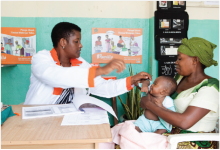
Social franchising has become an increasingly popular health systems strengthening strategy that taps into the reach and maximizes the potential of the private sector to improve access to health services. It is a relatively new discipline that has been tried and tested by several organizations in a wide range of country circumstances.
This course describes what social franchising strives to deliver: affordable, equitable, and high quality health services. The course will highlight the potential impact and benefits of social franchising as an approach to health systems strengthening, the conditions that foster a successful social franchise network, and the global landscape for social franchising and donor investment.
Objective
At the end of this course, learners will be able to:
- Describe a social franchise network model for delivering health services
- List the main goals of social franchising and describe how success is measured for each goal
- Articulate how social franchising can contribute to health system strengthening
- Describe emerging best practices in social franchising
- Describe social franchising’s reach and impact at the global level
Credits
The course authors would like to thank the following colleagues for reviewing the course and sharing their insightful feedback, which has made the course what it is today:
- Elaine Menotti, USAID
- Dominic Montagu, UCSF Global Health Sciences (GHS)
- Jim Shelton, USAID
- Margaret D'Adamo, USAID
- Marguerite Farrell, USAID
Time
- 2 hours
Published/Updated
- Thursday, August 14, 2014
Course Authors:
Christine Bixiones, Jen Pope, and Julie McBride, Population Services International, Strengthening International Family Planning Organizations (SIFPO) Project
Rehana Ahmed, Brendan Hayes, and Anna Mackay, Marie Stopes International, SIFPO Project
Course Managers:
- Nandini Jayarajan, CCP
